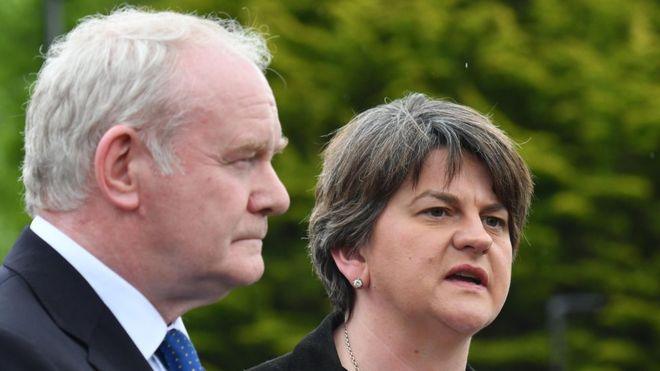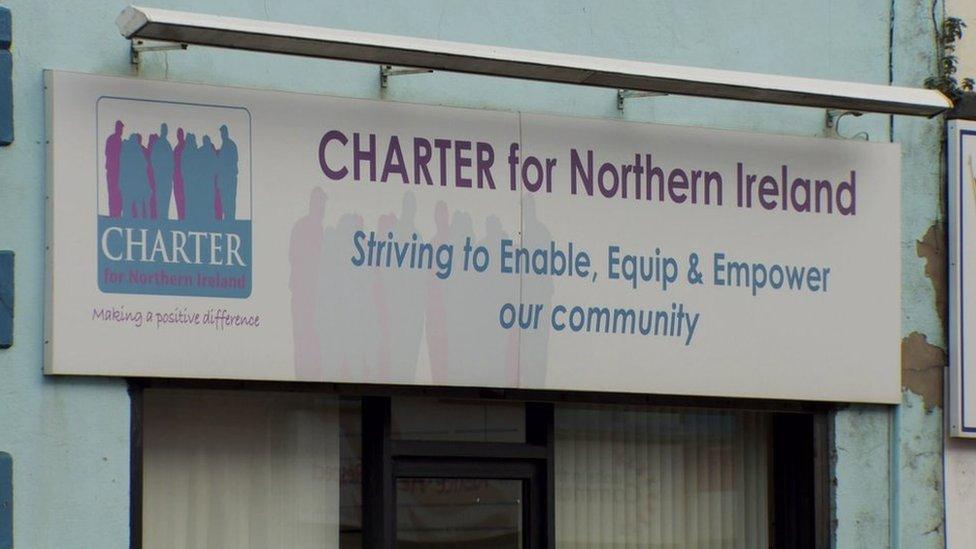Stormont's Social Investment Fund 'needs an extra £13m'
- Published

The the first and deputy first ministers' memo was leaked to the BBC
The Stormont executive's controversial Social Investment Fund (SIF) requires an extra £13m of taxpayer money, according to a leaked document.
A memo, in the name of the first and deputy first ministers, and sent to government departments last week, was passed to the BBC Spotlight programme.
It reveals SIF is currently projected to be £13.1m over budget.
The cost of the funding programme was supposed to be £80m, for projects targeting social need and deprivation.
But the memo says it will now cost £93.1m - a figure one government source predicted could rise further.
In the document Arlene Foster and Martin McGuinness say: "The purpose of this paper is to seek the executive's agreement to increase the budget and delivery period for the Social Investment Fund to allow full delivery of projects."
SIF was supposed to have been delivered and completed last year. It is now going to be running until 2020.
The proposal to cover the black hole in the SIF accounts and extend the scheme is due to be discussed at a meeting of the full executive.
However, the DUP-Sinn Féin executive is expected to agree to cover the cost. The memo says the Department of Finance has already said the shortfall will be met from what is called "existing annual central capital funds".
Why is SIF going so far over budget?
When SIF was devised in 2011, it was envisaged that the £80m pot of money would be split: £40m for capital projects, new community buildings; £40m for revenue projects, delivering programmes on the ground like employment schemes.
According to the leaked paper, it appears the huge additional financial requirement has been generated largely by unforeseen costs for the capital projects.
Instead of costing £40m, the running total for those capital schemes is over £52m.
The first and deputy first ministers say: "There continues to be a trend for rising costs in capital projects, with many requiring additional funding upon completion of detailed design and as they move into construction in order to be delivered in full.
"Whilst every effort is being taken to manage project costs, there are factors beyond the department's control which can result in the need for additional funding (eg discovery of asbestos)."
However, critics of the scheme and opposition parties are bound to raise questions about the management of SIF, and the Stormont executive's ability to manage the public purse - at a time when the executive is already under pressure, amid fears the flawed Renewable Heat Incentive scheme could cost taxpayers in the region of £400 million.

SIF has been beset by controversy for several months, beginning with concern that the programme had allocated funding to community organisation Charter NI which the PSNI has confirmed it believes includes a person or people who have connections with the UDA.
The DUP has been accused of favouring Charter NI and ignoring the UDA link.
However, the party has firmly rejected this. It has highlighted good work that Charter NI does and said if there is any evidence of an illegal nature it must be dealt with by the PSNI.
Charter NI has repeatedly stated that they "do not condone illegal or criminal activity of any kind".
Lack of transparency?
Opposition parties at Stormont have also claimed there are issues with SIF around a lack of transparency and tenders for contracts which they claim were not open to fair competition.
Earlier this month, the opposition at Stormont called for an independent inquiry into SIF, but the proposal was blocked on the floor of the assembly by the DUP and Sinn Féin who said the scheme was fully above board.
In a statement to BBC Spotlight, a spokesperson for the Executive Office said SIF has progressed very significantly over the last year and will deliver a total of 68 projects. Forty-two projects worth £54m have commenced and 17 projects worth £27m are already operational.
They also said: "Now that the full suite of projects to be delivered in each zone is known there is much clearer picture of costs emerging… there are factors beyond the Department's control which can result in the need for additional funding.
"These factors include rising construction costs and unforeseen issues emerging during the detailed design and construction phase - for example: discovery of asbestos.
"Every effort will be made to manage additional costs should they arise and all the necessary policies and procedures are in place and implemented to effectively manage and account for funding and these will be ongoing throughout the duration of the projects."